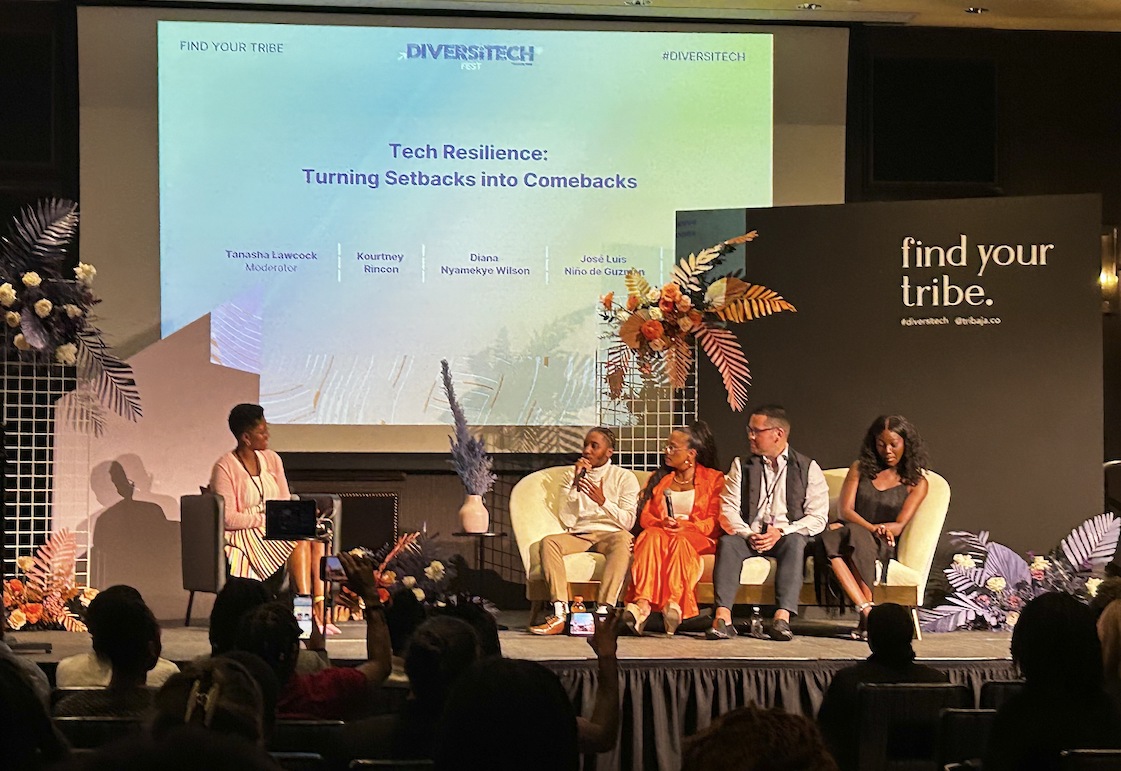In a constantly evolving industry that’s prone to layoffs and new inventions that upend how we work, resilience — the ability to persevere through setbacks — is necessary. And when you’re a non-white person in the white, male-dominated field of technology facing systemic bias, that need for resilience only grows more pressing.
At the Tribaja-organized tech conference Diversitech last week, technology pros from around the country gathered to talk leveling up their skills and navigating their careers, including during a panel on “Tech Resilience: Turning Setbacks into Comebacks.” Each of that panel’s speakers said they feel their identities as Black and brown technologists play a role in how they navigate the industry, pitch investors or make space for themselves at work.
One big takeaway from their conversation, which took place during Philly Tech Week 2023 presented by Comcast: You can’t control what your peers, employer or industry do, so be sure to take care of yourself first.
‘Let me get out of my own way first’
Kourtney Rincon, who’s the VP of sales for 2&Two Consulting, said she feels resilience is a part of the everyday lives of Black and brown people. It’s something she’s had to harness over the years to get to where she is.
“Resiliency in tech is creativity. It’s curiosity. It’s patience, and it’s passion. And you have to have all of those things,” she said. “Especially in tech, because it’s changing rapidly.”
Sunnie Jones, lead software engineer at Amelex and a Black trans man, has recognized that he has to be “untouchable” in his career. Be determined to get the best you can be at the skills you’re honing, he said, and learn how to advocate for yourself.
He’d started a web design firm right before COVID-19 hit, and the pandemic slowed business, forcing him to level up on some specific skills to land a role as a senior developer. The experience at a 9-to-5 wasn’t exactly what he had in mind, but it boosted his confidence in his skill set, and helped him recognize that you need to ask for what you need in a role.
“When walking into a room, you’re making sure that when you don’t like something, or you need something, that you advocate for yourself in getting it done,” Jones said.
José Luis Niño de Guzman, cofounder of Purely Prep, agreed, saying that he learned early on in his tech career that there were going to be a lot of external barriers for him. A few months ago, he was one of those affected by the layoffs at Meta. To succeed, he said, he had to not let himself be an additional barrier.
“Let me get out of my own way first,” Guzman said, “and let me operate according to the manner in which I know that I can, which I am an equal and an asset, just as any one of my peers.”
Diana Nyamekye Wilson, founder and CEO of Black Sisters in STEM, listed a few pieces of advice that she follows: Always have hope, learn to be disciplined, and know your worth.
Boundaries for success
When moderator Tanasha Lawcock prompted the group to reflect on the tools that helped these technologists come to these mindsets, a chorus of “therapy” rang off the stage. Rincon agreed, adding that learning how to set boundaries was an essential part of her success.
“I’ve had so much trauma. And I also have four kids and I’m an entrepreneur,” Rincon said. “And so burnout is very possible, and very not fun — I’ve been there. So what I’ve learned now is … learning to say no more often.”
It can also look like “front loading” your expectations at work to make both your personal and work lives work for you. Guzman has spoken to previous managers about the asynchronous work style that allows him to get everything done well for his job and with his young son at home.
“It almost feels like there’s a contrast, or friction between self care and resilience,” Guzman said. “I think they go hand in hand and they need to complement one another.”







